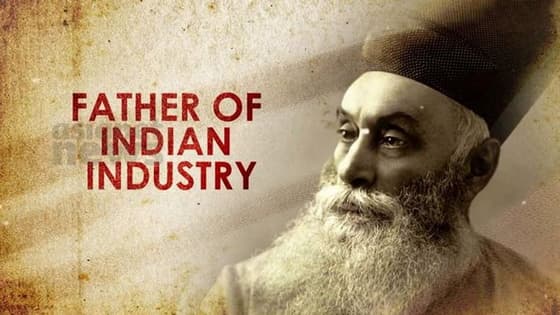
India@75: Jamshedji Nusserwanji Tata, the father of Indian Industry
Founded in a modest way, there are not many sectors where Tata Group is not present today. It has assets worth Rs 8 lakh crore and is spread in 100 countries with about 8 lakh employees. Here's the story of the man who started it all, Jamshedji Nusserwanji Tata.
Jamshedji Nusserwanji Tata. Father of Indian Industry. Most prominent among those who laid the foundations for India’s modern industry. Founder of India’s most prominent business empire. Prime Minister Nehru called him the one-man Planning Commission. One of the greatest philanthropists in India.

Jamshedji was born in 1839 to a Parsi priest's family with roots in Iran at Navsari, in Southern Gujarat. His son, Nusserwanji, was the first to break the family's priestly tradition of becoming a businessman. He migrated to Mumbai with his family and set up an export firm. Thanks to his progressive father, Jamshedji was among the first in Parsi families to receive western education.
After graduating from Elphinstone college, Jamshedji joined his father's export business which had spread to Japan, China and Europe. Jamshedji's father sent his son to China to learn about the period's most lucrative business -- opium trade.
Jamshedji started his firm when he was 29. He bought a bankrupt oil mill and converted it to a cotton mill, Mumbai's booming sector. It was the Alexandra Mill. This followed many more mills under Jamshedji. In 1903, Jamshedji realised his dream to build India's largest hotel -- The Taj Mahal hotel in Mumbai. It was the first Indian hotel to have running electricity and remains one of India's best hotels even after over a century.
Along with business, Jamshedji was a keen follower of the Swadeshi movement. Though not politically active in the movement, he tried to put into practice the spirit of the movement. Much before the Congress party launched the Swadeshi movement, Jamshedji named his cotton mill Swadeshi Mills as early as 1886.
Jamshedpur, India's first planned industrial city, was founded by him and established by his son Dorabji Tata. Originally located in Bihar and now in Jharkhand, it was the town that came into a village around India's first steel mill Jamshedji, founded in 1907. The Tata Iron and Steel Company, or TISCO, which became the British empire's largest steel-producing mill, proved the backbone of India’s own industrial progress. Known as Tata Steel, it still remains one of the world's largest steel makers.
Today, Jamshedpur is Tata Nagar. Founded in a modest way, there are not many sectors where Tata Group is not present today. It has assets worth Rs 8 lakh crore and is spread in 100 countries with about 8 lakh employees. It is India's biggest transnational and the best Indian brand name, universally. It also has highly reputed institutions in fields like healthcare, academic research etc.
Jamshedji or the Tatas were not active in politics nor were Gandhiji's fellow travellers like the Birlas or the Bajajs. Yet, Jamshedji’s son Sir Ratanji Tata was Gandhiji's largest financial supporter for his political campaigns in South Africa. Gandhiji described Jamshedji as one of India's selfless servants.
Also Watch: India@75: Barrister GP Pillai, most prominent Indian editor of the 19th century
Also Watch: India@75: Ashfaqulla Khan, the youngster who fought against British rule
Also Watch: India@75: Gangadharrao Balakrishna Deshpande, the Lion of Karnataka